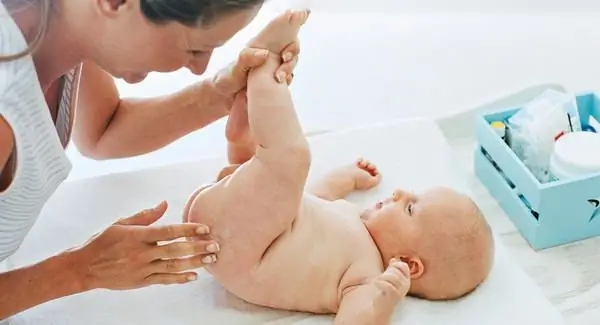- Author Horace Young young@householdfranchise.com.
- Public 2023-12-16 10:35.
- Last modified 2025-01-23 11:41.
In infants, the skin is especially delicate, thin and easily susceptible to adverse conditions. And every second mother is faced with such an unpleasant problem as diaper rash or diaper dermatitis.

Diaper rash is an inflammation of the baby's skin in areas of the body that are most susceptible to friction and prolonged exposure to moisture. Diaper rash appears especially often in the following areas:
- buttocks;
- armpits;
- neck;
- chest;
- stomach;
- genitals.
There are three degrees of manifestation of diaper rash:
- There was a slight reddening of the skin without damaging it.
- The redness became brighter, microcracks appeared.
- The redness of the skin is more pronounced; redness began to "get wet" and abscesses appeared, which then turn into ulcers.
Any degree of diaper rash is accompanied by itching, burning, and pain. Not only the baby suffers from this, but also his mother, who is very worried about the well-being of her child. Diaper rash is an inflammatory skin condition that can be caused and worsened by many factors.
These factors are:
- humidity;
- heat;
- lack of air circulation;
- friction between the folds of the skin.
Diaper rash treatment
Diaper dermatitis cannot be ignored categorically, as it can be complicated by the addition of bacterial and fungal infections. Prevention of diaper rash in babies should be done as follows:
- Change disposable diapers at least every 3-4 hours, periodically removing it and letting the skin "breathe".
- After each bowel movement, wash the baby (it doesn't matter whether he did little or big things).
- Choose the right diaper size for your baby so that air can circulate freely inside.
- Don't forget about clothes! It should be loose so that a wet diaper does not stick and irritate the skin.
- Do not overdo it with creams and powders. While these treatments have minimal benefits, they can cause irritation.
- When washing clothes, use special children's powders that do not contain fragrances. Rinse the laundry thoroughly after the main wash.
In cases leading to the second and third degree, it is necessary to consult a doctor who will select the appropriate treatment.






